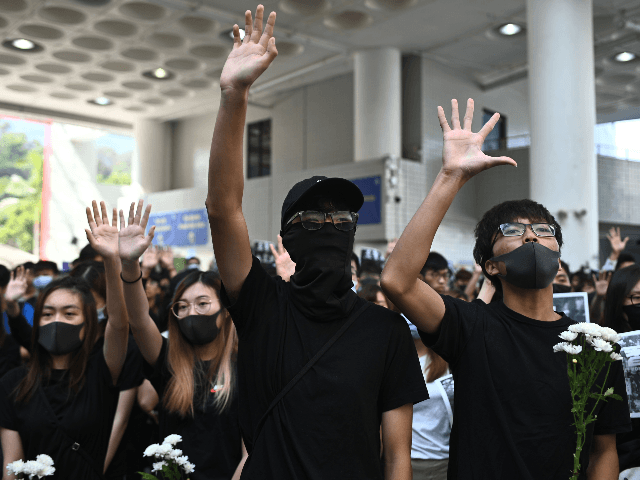The Chinese state propaganda outlet Global Times announced Monday that Chinese universities have begun limiting the number of students from Hong Kong they allow into the schools for fear that the protest movement against communism in the autonomous city will spread to campuses.
The six-month-old Hong Kong protest movement enjoys support from all walks of life in the city – highlighted by the millions of people that have participated in rallies and marches – but many of those who can afford to spend the most time out in the streets defending the city are Hong Kong’s youth. Attacks by Hong Kong police have turned several of the city’s college campuses into war zones, forcing protest supporters to hide or face a barrage of tear gas, water cannons, and other crowd-control weapons.
The Chinese government, through its many propaganda outlets, has condemned Hong Kong’s education system for valuing critical thinking and free discussions among its students, calling for schools to indulge in more “patriotic” teaching that encourages students to embrace the Communist Party.
Hong Kong is an autonomous city within China that under the “one country, two systems” policy cannot secede from Beijing. The policy also prevents Beijing from imposing communism on Hong Kong, though the protest movement contends dictator Xi Jinping has done little to adhere to this limitation, increasingly pressuring Hong Kong’s government to submit to the Party.
As the Hong Kong protest movement has strengthened, China has experienced protests within its borders – particularly in the province bordering Hong Kong, Guangdong – apparently inspired by Hong Kong.
The Global Times claimed on Monday that some Chinese universities are moving to contain the city’s “social unrest” by limiting the number of Hong Kong students in their ranks.
“Universities including Tongji University in Shanghai and Fuzhou University in East China’s Fujian Province clearly stated in their 2020 enrollment plan that Hong Kong applicants have to uphold the ‘one country, two systems’ principle and the Basic Law,” the Times reported. “An employee at the admission office of Tongji University said the requirement was added this year after considering a number of students in Hong Kong participated in the six months of protests.”
The Chinese government outlet plainly stated that the goal of the new policy was to “prevent a very few applicants from allegedly spreading secession ideas to the mainland,” China’s term for territories outside of Beijing’s rule that it illegally claims control over. The Times noted that at least one university stated that participation in the protests would automatically disqualify an applicant from attending some of the schools named. The schools already require students to not have a criminal record, which could include participation in the protests if unfairly arrested while engaging in peaceful assemblies against the Communist Party.
The report follows the revelation last week that residents of a town in Guangdong, inside of China, took to the streets and began chanting Hong Kong protest slogans in protest of the planned construction of a new crematorium near their homes. The Communist Party had promised Wenlou, Guangdong, the construction of a “human ecological park,” but later began constructing the crematorium instead – replacing a plan residents were told would greatly improve pollution and environmental health in the area with, essentially, a toxic chimney.
Reports from unnamed witnesses in Wenlou said protesters chanted “revolution of our times” – the second half of the now-iconic “liberate Hong Kong” flagship slogan – and “just like you, Hong Kong!” while flooding the town’s streets. Images appeared on social media of lines of police cars turned on their sides in protest and other attacks on state infrastructure.
In late summer, Chinese officials, apparently predicting the potential popularity of the Hong Kong protests within its borders, began flooding Guangdong with thousands of troops and military hardware, which Beijing claimed was there in case it was needed against the Hong Kong protesters.
The Global Times and similar publications have for months attacked the Hong Kong school system as a culprit in inculcating support for democracy and human rights in its students.
“Incomplete education and biased media reporting have played a very negative role in helping shape their misunderstanding about the country,” the Global Times alleged in July, also objecting to Hong Kongers’ access to social media outlets such as Facebook and Twitter, which China bans its citizens from using.
Hong Kong police began acting against protesters following the replacement of outgoing Police Commissioner Stephen Lo with Chris Tang, brought in as Lo had delayed his retirement in the aftermath of protests erupting in June. China’s state publications lauded Tang as more prone to the use of violence against protesters than his predecessors. Shortly after he took over last month, police attacked the campus of Hong Kong Polytechnic University (PolyU), flooding it with tear gas and shooting at students that opposed the invasion. Police trapped hundreds of students on the campus for over a week, many of who escaped dramatically by jumping off campus bridges or seeking sewer tunnel exists.

COMMENTS
Please let us know if you're having issues with commenting.